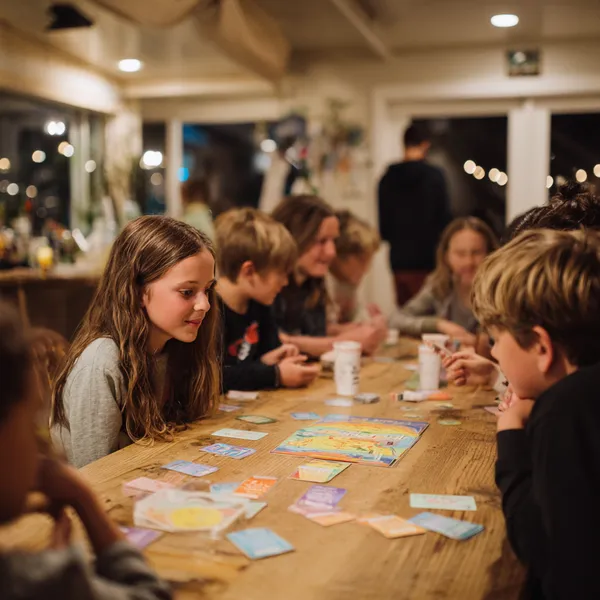So I'm sitting in this planning meeting and someone goes "We should do a game night for families!"
Everyone's nodding like this is a brilliant idea and I'm thinking oh great, another event I gotta plan that nobody will come to.
But then Sarah mentions her kids have been begging to hang out with church friends outside Sunday morning. Tom says his family would love something fun and low pressure. Jessica's daughter keeps asking when she can see her Sunday school friends again.
Okay, maybe this isn't a terrible idea after all.
But also I have zero clue how to plan a game night that doesn't turn into a complete disaster. What games? How many people? What if kids fight? What if parents are bored? What if nobody shows up?
Turns out planning game night is way easier than I thought and also way more chaotic than I expected. But in a good way, mostly.
Figuring Out What Games Actually Work
First mistake was assuming we needed fancy elaborate games that take forever to learn.
Spent like two hours researching strategy games for families online. Found all these complicated things with weird rules and multiple expansions.
Then I remembered we're talking about kids who can barely sit through a ten minute Bible lesson without someone having a meltdown.
Started simple. Uno. Go Fish. Jenga. Charades. Games everyone already knows.
Turns out simple games are way better because you spend time playing instead of explaining rules for thirty minutes while kids zone out.
Marcus who never pays attention during church stuff? Totally focused during Uno because he understood what was happening.
Space Planning That Actually Works
My brilliant idea was cramming everyone into the fellowship hall with folding tables everywhere.
Looked like a prison cafeteria. Super inviting.
Sarah suggested we spread out more. Use classrooms for different activities. Let people move around instead of being stuck at one table all night.
Set up Uno tournament in main room. Board games in kids classroom. Charades in youth room. Snacks in kitchen obviously.
Way better. People could find their comfort zone instead of everyone doing the same thing.
Shy families gravitated toward quieter board games. Loud competitive families took over the Uno tournament. Kids who couldn't sit still loved charades.
Food That Doesn't Cause Drama
Originally planned elaborate dinner because I thought we needed to feed everyone a proper meal.
Then I calculated cost and stress level and was like nope, not happening.
Pizza and drinks. That's it. Ordered way too much because better to have leftovers than run out.
Kids were happy. Parents were happy. I didn't have a nervous breakdown trying to coordinate a potluck or cook for fifty people.
Only drama was arguing over the last piece of pepperoni pizza which honestly was pretty mild compared to usual kid conflicts.
Age Group Reality Check
Thought we could just mix all ages together and it would be magical family bonding time.
Turns out four year olds and twelve year olds don't really want to play the same games. Shocking, I know.
Had to adapt on the fly. Older kids helped younger kids with games they couldn't quite manage alone. Teenagers became unofficial game referees when little kids got confused about rules.
Actually worked better than everyone playing separately. Older kids felt important being helpers. Younger kids loved attention from big kids.
Emma who's usually shy totally came out of her shell when Tyler helped her with a card game.
Managing Competition Without Tears
Kids get competitive about everything. Breathing. Walking. Existing.
Learned to head off drama before it started.
"We're playing for fun, not keeping score." "If someone gets upset we take a break." "Everyone wins when everyone has a good time."
Still had a few meltdowns when kids lost games but way less than expected.
Tom's son who usually has attitude problems? Actually consoled another kid who was upset about losing Jenga. Completely shocked his parents.
Parent Participation Levels
Some parents jumped right in playing games with kids. Others sat back watching and chatting with other adults.
Both totally fine. Don't force people to participate if they're not comfortable.
Made sure there were spaces for parents who wanted to play and spaces for parents who just wanted to supervise and socialize.
Jessica's husband who never talks to anyone? Ended up in an intense Monopoly game with three other dads and they were having a blast.
Sarah's mom who's super quiet? Loved helping little kids with puzzles because she could interact without being center of attention.
Timing That Actually Works
Originally planned three hour event because more time means more fun, right?
Wrong. Kids start melting down after about ninety minutes. Parents start checking phones and making leaving noises.
Two hours max. Start at six, end at eight. Everyone goes home before anyone gets cranky.
Short enough that people aren't exhausted. Long enough to actually play some games and connect with each other.
Game Ideas That Work
When looking for Youth Group Games and family-friendly activities, simple is always better than complicated.
Found Banana Dinner Relay recently—ridiculous relay race that had kids and parents laughing together. Type of game where everyone looks silly so nobody feels embarrassed. Perfect for mixed-age game nights.
Best games are ones where losing is still fun.
What Worked Way Better Than Expected
Kids teaching adults games they knew. Tyler showed Jessica's dad how to play Pokemon cards and they were both totally into it.
Mixed age teams for charades. Teenagers acting out clues while little kids guessed. Hilarious and sweet.
Parents connecting with other families outside Sunday morning chaos. Turns out they actually like each other when they're not rushing around.
Older kids babysitting younger siblings so parents could play grown up games for a few minutes.
What Was a Complete Disaster
Trying to do an organized tournament bracket for Uno. Too complicated and kids didn't care about advancing to the next round.
Having too many game options. Kids spent more time deciding what to play than actually playing.
Not having enough volunteers to help manage different areas. I was running around like a crazy person trying to be everywhere at once.
Lessons I Learned the Hard Way
Keep games simple so you spend time playing, not explaining rules.
Have backup activities for kids who don't want to play main games.
Set clear expectations about behavior and competition before starting.
Don't try to control everything. Let families find their own fun.
Have volunteers in each area so you're not the only adult managing everything.
Plan for shorter time than you think you need.
What Parents Said After
"Best church event we've been to in years because it was actually fun."
"My kids haven't stopped talking about game night all week."
"So nice to hang out with other families without an agenda or lesson plan."
"Can we do this every month?"
"Even my teenager had a good time which never happens at church stuff."
What Kids Said
"When can we do this again?"
"Can I invite my friend from school next time?"
"That was way more fun than regular church."
"I didn't know adults could be good at games."
"Tyler is actually really nice when he's not in Sunday school."
Why This Actually Matters
Families need ways to connect outside formal church programming.
Kids see church friends as real friends instead of just Sunday acquaintances.
Parents build relationships that support them during hard times.
Creates community that extends beyond one hour on Sunday morning.
Shows church can be a fun place instead of just an obligation place.
Builds foundation for families to support each other long term.
Planning the Next One
Keeping same basic format because it worked.
Adding a few new simple games based on what people requested.
Getting more volunteers so I'm not running around like a maniac.
Maybe doing themed nights occasionally. Board game night. Card game night. Outdoor game night if the weather's nice.
But mostly just keeping it simple and fun because that's what worked.
Tom's family already asked if they can host the next one at their house. Sarah volunteered to bring games from her collection. Jessica wants to organize a snack signup.
That's when you know an event was a success. When people want to help make the next one happen instead of just hoping someone else handles it.
Marcus who never talks to anyone? Asked if his friend from school can come next time. That kid who sits in a corner during Sunday school wanting to invite friends to a church event.
That's what good family programming looks like. Not complicated. Not expensive. Just a fun way for people to be together and actually enjoy each other's company.
Worth every bit of chaos and pizza grease on the fellowship hall carpet.
Watch YouTube
Listen to Podcast








